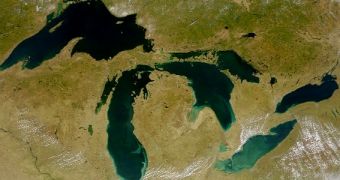Experts led by Carl Watras from the University of Wisconsin-Madison (UWM) Trout Lake Research Station have discovered in a new study that the Great Lakes in North America appear to exhibit water level variations consistent with a decade-long cycle, similar to the Sun's 11-year cycle.
Watras, who is also a research scientist with the Wisconsin Department of Natural Resources, says that the trend affects both lakes and aquifers in the northern parts of the state, as well as lakes Michigan, Huron, and many other, smaller bodies of water in between.
The team was able to determine that these lakes tend to exhibit a very high water level peak at one point, and then display progressively-lower levels over the next 10 years. Once this period passes, levels abruptly increase again, only to start receding shortly afterwards.
Investigators say that this has been going on for at least 70 years – as far back as available data go – but could be happening for millennia, or even longer. “There was absolutely no reason for us to expect that our little lakes and lakes Michigan and Huron would act the same way, but they did,” Watras comments, quoted by PhysOrg.

 14 DAY TRIAL //
14 DAY TRIAL //